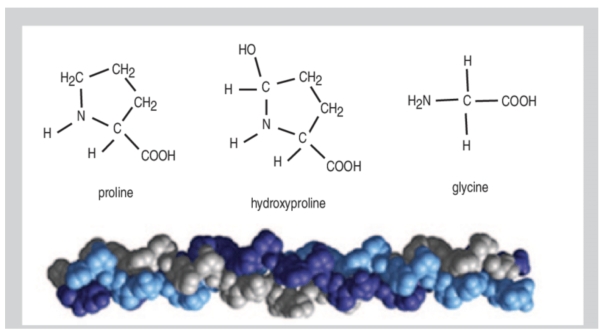Do collagen supplements work?
04/04/25
I’m a GP with a background in Dermatology. I have a life time’s love of holistic medicine and how to improve the health of your skin. Here’s what I think about collagen supplements.
Let’s break things down and go through some common Q&As I get asked.
Do I actually need collagen supplements for my skin health?
You will have heard me say, “You won’t need collagen supplements if you have a wide and varied diet and have maximised all the scientifically proven ways of improving skin health such as sun protection, vitamin A and C in your skincare”. I know, as a doctor, that all protein consumed whether it is in the form of a tuna steak or whether it is collagen supplement, gets broken down into amino acids that then get transported across the gut mucosa (lining). Your body then uses these amino acids to build or maintain muscles, joints, bone, skin and more. Protein is most crucially needed for muscle preservation, irrespective of how much exercise you do, and is crucial to have plenty in your diet when you age as you will naturally lose muscle mass (a process called sarcopenia).
The best sources of amino acids are animal proteins such as meat, poultry and fish. However, some plant foods, such as soy, nuts, seeds, pulses and wholegrains are also great sources of protein. We also know spacing your protein consumption out during the day will improve your body’s absorption of it.
Collagen is a complex protein. It is really abundant in humans and is present in your bones, ligaments, tendons, joints and skin. In the skin, it is like a mattress that supports the upper layers of the dermis. Unfortunately for us, our collagen naturally declines from our 20s. It is estimated by our 40s we have lost about 20% of our collagen. During the first 5 years of menopause women lose a further 30%. When collagen declines, the skin thins and wrinkles, bones thin (osteopenia/ osteoporosis), joints deteriorate (arthritis and pain), hair thins and the nails become brittle. However, our body can build new collagen in some areas of our body from the nutrients in our diet. The collagen in our skin can be stimulated to grow by certain aesthetic treatments (like radiofrequency microneedling, bio-stimulating injections, etc). When a certain type of skin collagen is made it has a half-life of 15 years.
Is there any scientific proof collagen supplements work?
A meta-analysis of a variety of clinical studies was published in the International Journal of Dermatology in 2021. The researchers concluded that collagen supplements will produce a statistically significant improvement in skin elasticity with hydration and will reduce skin roughness. However, there are some caveats to the studies that were analysed. Some of them were company sponsored, so they have a bias, and the skins were often analysed using sophisticated laboratory machinery. So, would these skin changes be seen by the naked eye? I don’t know. However, it still is proof that changes were created. There must be something about collagen supplements to make them so popular, there are a plethora of ardent consumers who are convinced that they see and feel and difference in their skin, hair, nails and overall health.
Why are most skin collagen supplements hydrolysed?
Hydrolyzed collagen is a protein supplement that is formulated into small, easy-to-absorb amino acids. There is marine (from fish) and bovine (from cows) collagen. When these small amino acids enter the gut it makes them easier to absorb and thus more likely to make a difference to your skin and body. There are arguments about which is the better source. Some cite that cow (mammalian) is the most similar to human and therefore humans respond to the signalling more effectively. Studies show that bovine derived hydrolysed collagen reduces the expression of MMP2 (matrix metalloproteinase Type 2). This is an enzyme that is associated with inflammation, fibrosis and breakdown of collagen.
Does my diet have enough protein in it?
Maybe not. From my personal perspective, I thought I had a wide and varied diet and was easily meeting my protein requirements, until I actually calculated how much I was consuming. In my attempts to eat healthy I was eating my 5 a day of fruit and vegetables, but I was definitely deficient in daily protein consumption. I was maybe averaging ½ of the protein I should be eating for my age! That was a surprise.
Why am I now taking supplements?
I’m a busy 52 year old full-time doctor, mother of 2 girls and a husband who works full time as a consultant in the NHS. Meals are often hurriedly cooked in an evening with a generous helping of carbohydrates like rice and pasta. Breakfast and lunches are small and often with fruit and some carbs. I will admit, these meals are calorie light to keep my weight stable.
I did some calculations, and was amazed by how much protein I actually need to eat to hit the target of 1-1.2g per kg body weight (this is the recommendation for post-menopausal women). For those aged 19-50 years of age, the guidance is 0.75mg/kg. I had a look at some protein-based meal plans. Gosh, those that I researched and found, looked like I needed to eat a lot more food daily to reach my protein goals. All protein consumed that is surplus to requirements, will be deposited as fat on the body. I don’t want to negate the health benefits of remaining within a normal BMI because I want to hit my target for dietary protein. I needed help and so I looked into the science of protein and collagen supplements.
I have been more mindful of increasing the protein in my diet however, in particular I’ve added things like FAGE yogurt with berries and nuts to my breakfasts, I’ve added more eggs to my lunch options and have added a more regular protein snack to my busy clinic days. However, I know I still was not hitting the desired target of 60g of protein a day. So, I wanted an easy, practical and effective alternative to relying solely on dietary sources of protein to ensure I got enough.
So, I did a deep dive into lots of the multitude of variable collagen supplements out there. I wanted one with a high-quality collagen that is really bio-available so I know I have a high chance of absorbing a good amount. Knowing what I know about skin health, I paid particular attention to the additional ingredients that will support collagen renewal in the skin and the body. In particular I wanted vitamin C, Vitamin E, Zinc, linoleic acid, maybe some hyaluronic acid (as it has been shown to improve the hydration of the skin) and other proven anti-oxidants to make sure my skin nutrients were really optimised.
I started taking my supplements about 10 weeks ago and here’s what I see.
What changes have I seen?
People are commenting that my skin looks glowing and radiant. Yes, well I know I spend as much on my face as some spend on a mortgage (heck), but the comments have increased in the last 2 months, so I’ll take that. My red rosacea prone skin definitely feels more comfortable and I’m less prone to those blotchy red necks I get (pesky Neurogenic and Erythematotelangiectatic Rosacea).
My hair is growing so quickly! It’s thicker and glossier than before, although I had a 6 week spell of Calecim Hair system 9 months ago, so maybe there’s a bit of both interventions at play here, but my hair is definitely thicker and glossier.
My fragile splitting nails are much stronger and not splitting of late, despite my repeated hand washing.
I’ve lost 2 kg in weight. Plus, the belly fat that I’ve struggled to reduce since my bike accident 18 months ago, is definitely reducing. My strength in the gym has really improved. Yes, it could be that my stamina is increasing but I do notice a positive change. It’s no secret that protein in your diet helps with the feeling of satiety and increased muscle mass will increase your metabolism. These changes are probably the result of increased protein in my diet, but I wonder if the supplement is helping too.
Importantly for me, I’ve managed to reduce my pain relief. Those that know me know that I had a terrible mountain biking accident in July 2023. It resulted in a broken neck, thoracic vertebrae and ribs. Then I had complications resulting in sepsis, critical bone marrow failure and a month on ITU. As a result, I have residual neck and upper backache and take daily pain relief. Interestingly, in the last 3 weeks I’ve been able to reduce my analgesia. Now whether this was due to the supplements, or simply the passing of time and increasing exercise capacity, I don’t know. However, I know my supplements contain ingredients that are anti-inflammatory and beneficial for joints, so I suspect that may have played a role.
What supplements do I recommend?
So, if your diet is a bit "hit and miss" and you've actually measured your protein intake and calculated it doesn't meet the demands of your body, then first of all you need to add more protein to your diet. However, if like me, your diet is not always consistently good, then you probably WILL benefit from supplementation.
The actual supplement I would recommend depends on your age, weight, exercise regime, existing health conditions and current medication.
Whilst I have some supplements that I like for my health, if you want a bespoke treatment plan of what supplements you need, just keep an eye on this blog as more information for my patients is coming soon!
Want to book in?
Click the link HERE to book in online
Or call 07711190079 to speak to our reception.
We are a boutique, single doctor injector clinic located in North Wales and neighbouring the North West of England / Chester area.







